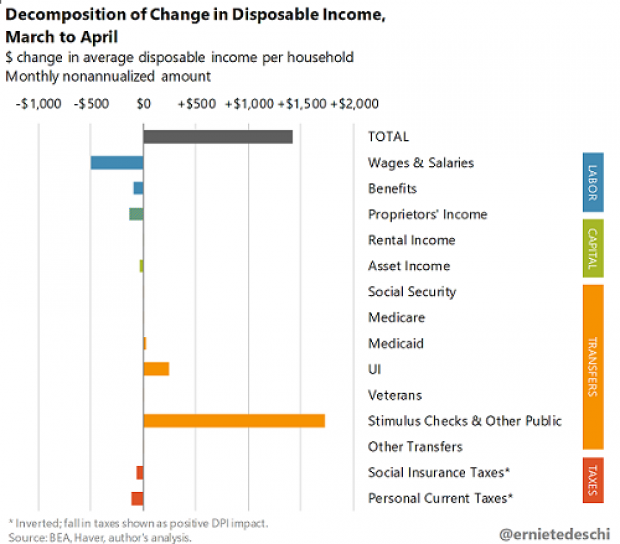U.S. personal income rose by $1.97 trillion in April, the Commerce Department reported Friday. At 10.5%, it was the largest month-over-month increase on record – and it was driven almost entirely by the coronavirus relief transfer payments authorized by Congress in March.
The one-time relief checks of up to $1,200 per adult and $500 per child sent to most households made up the lion’s share of the transfer payments. Unemployment benefits, boosted by an extra $600 per week in supplemental federal payments, made up most of the rest.
At the household level, average monthly compensation fell by $600, no doubt reflecting significant job losses. But that drop was more than made up for by an increase of $1,400 in government assistance. (The chart below from Ernie Tedeschi of Evercore ISI beaks down the household income components in April.)
As Vox’s Matthew Yglesias noted, the monthly jump in income has everything to do with the median wage of lower-income workers, who were more likely to lose their jobs and temporarily earn more on unemployment once state and federal benefits were taken into account. The “median American worker earns about $949 per week,” Yglesias said Friday, “so $600 plus a fraction of that is going to come up to more income in many cases than what they would earn by working.”
Without transfer payments from various government sources, personal income would have dropped 6.3% in April. This would have been the largest drop in personal income on record, former White House economic adviser Jason Furman said.
Despite the jump in income, consumer spending dropped by 13.6% in April, the Commerce Department said, as the economy shut down in response to the coronavirus epidemic. It was the largest one-month drop on record.
A one-time event: “The reason the numbers look so extreme this month was because of the one-time checks that were sent out -- which won’t be continuing,” Michelle Meyer, head of U.S. economics at Bank of America, told Bloomberg News. And as numerous economists have warned, if federal relief efforts end after July, the income numbers will start looking considerably worse in August and beyond.




